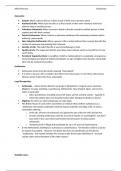Dillon Precious Euthanasia
Keywords:
Suicide: When a person dies as a direct result of their own voluntary action.
Assisted Suicide: When a person dies as a direct result of their own voluntary action but
with the help of another person.
Voluntary Euthanasia: When a person’s death is directly caused by another person at their
request and with their consent.
Passive Euthanasia: When a doctor or physician withdraws life-sustaining treatment which
indirectly causes death.
Non-Voluntary Euthanasia: When a person’s life is ended without their consent but with the
contest of someone representing their interests.
Sanctity of Life: The belief that life is sacred and belongs to God.
Quality of Life: The argument that life must have some intrinsic worth or benefit for it to be
worth living.
Persistent Vegetative State: A condition I which a medial patient is completely unresponsive
to psychological and physical stimuli and displays no sign of higher brain function, being kept
alive only by medical intervention.
Euthanasia:
Euthanasia comes from the Greek meaning “Good death.”
It is when a person’s life is ended to free them from future pain; it is for those with serious
illnesses which makes their lives unbearable.
Legal Perspective:
Euthanasia – where doctors directly use drugs to kill patients, is legal in seven countries
(Belgium, Canada, Colombia, Luxembourg, Netherlands, New Zealand, Spain, and several
states in Australia).
o Other jurisdictions, including several US states, permit assisted suicide – typically in
which the patient takes the drug themselves after being prescribed by a doctor.
Dignitas: the clinics in which euthanasia can take place.
The British House of Lords select committee on medical ethics defines euthanasia as a
“deliberate intervention undertaken with the express intention of ending a life, to relieve
intractable suffering.”
o In the UK, all forms of euthanasia are against the law under the 1961 Suicide Act.
o Anyone assisting euthanasia could be accused of murder or manslaughter, but there
have been a few cases where permission has been given to allow passive
euthanasia.
o Assisted suicide is illegal and punishable by up to 14 years of imprisonment.
In the Netherlands and Belgium, euthanasia is understood as “termination of life by a doctor
at request of a patient.” However, the Dutch law does not specifically use the phrase
“euthanasia,” but instead includes the concept under the broader definition of “assisted
suicide under and termination of life under request.”
Notable Cases:
, Dillon Precious Euthanasia
Martha Sepulveda, a Colombian diagnosed with ALS (motor neurone disease, a
degenerative disease which targets the nervous system, weakens muscles, and severely
affects mobility), became the country’s first non-terminal patient to die via euthanasia, in
January 2022. She was a devout Catholic and believed that God would support her
autonomy and dignity. She did not believe that it went against her faith – “I’m at peace.”
Tony Bland (1989) suffered severe brain damage after the Hillsborough football stadium
disaster. He was on life-support, as he was able to breathe and feed, but was in a deep
coma. After a lengthy legal debate, his life support was turned off. This case acknowledged
that doctor cannot be expected to maintain a life (however defined) at all costs.
Mary Ormerod (1995) was starved of food and fluids, after her daughters had taken a
decision, due to her not communicating with the outside world. Dr Ken Taylor, the GP who
took the decision, was suspended for 6 months.
Acts and Omissions:
The Hippocratic Oath: The oath that doctors take states that they will “do no harm or
injustice… Neither will I administer a poison to anybody when asked to do so, nor will I
suggest such a course… I will abstain from all intentional wrong-doing and harm.”
o However, in other writings he also suggested that doctors should refuse to treat
those who are taken over by their diseases, realising in such cases that medicine is
powerless.
An act is one which causes death, is morally and legally wrong.
An omission is where treatment is stopped or withdrawn, so as not to prolong the inevitable
death of the patient.
Sanctity of Life Vs Quality of Life:
Sanctity of Life:
o It refers to the idea that life is special and is of infinite value. It can stem from both
religious (life is sacred because it comes from God) and non-religious (it has inherent
worth) ideas.
o Most supporters of Sanctity of Life debates believes that human life should be
preserved at all costs.
o Pro-Life.
Sanctity of Life in the Bible:
o Genesis 1:27 - “So God created man in his own image, in the image of God he
created him; male and female he created them.”
o Exodus 20:13 - “You shall not murder.”
o Job 1:21 - “Naked I came from my mother's womb, and naked I will depart. The Lord
gave and the Lord has taken away; may the name of the Lord be praised.”
o Psalm 139:16 - “Your eyes saw my unformed body; all the days ordained for me were
written in your book before one of them came to be.”
Quality of Life:
o This describes the level of comfort and freedom from mental and physical
constraints someone experiences.
o Many believe that SoL is less important than the mental or physical torture a patient
suffers, including some treatments too.
o Pro-Choice.
Modern Christian viewpoints on SoL:




